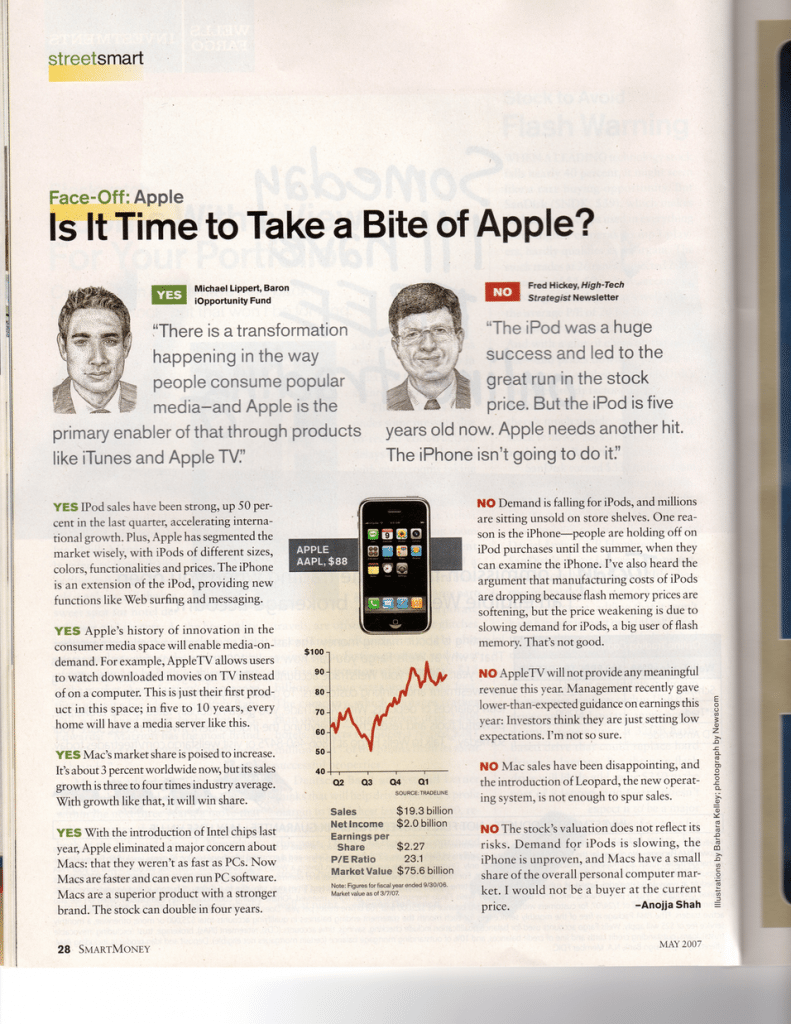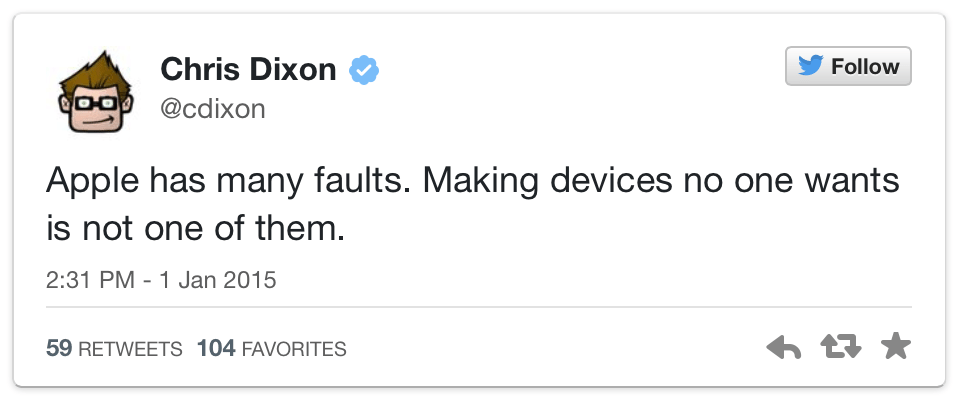A number of prominent personalities on Twitter yesterday retweeted some “expert” opinions of the iPhone from 2007. I particularly liked this paragraph:
The big competitors in the mobile-phone industry such as Nokia Oyj and Motorola Inc. won’t be whispering nervously into their clamshells over a new threat to their business.
The iPhone is nothing more than a luxury bauble that will appeal to a few gadget freaks. In terms of its impact on the industry, the iPhone is less relevant.
This image of a Street Smart article also contained a notably negative view on Apple’s chances with the iPhone as well.

This view of Apple from many “smart” people seems rooted in what I call the common misunderstanding of Apple. Most investors, either VCs or Wall St., like to put nice, clean definitions they can understand on the companies they cover. They like to use a template for other similar companies. Often, trying to fit Apple into their templates is like trying to fit the proverbial square peg in a round hole. And when their predictions about Apple or their products don’t pan out, they have little explanation. This type of investor has templates for hardware companies, software companies, and services companies. They more often than not use a hardware template model to analyze Apple because Apple generates nearly all of its revenue from hardware products. However, that would not be possible if they did not also own their software and services. A tricky combination for most.
But I’ve always found it helpful to think to what a company actually sells. And while I’m generalizing this viewpoint, I’ve always felt Apple is an experience company and, at the center, that is what they sell. It is the experience of their products consumers gravitate towards. It starts with the design and flows to the simplicity and delight that comes from the software. Tight services integration will be the next step Apple brings their famous experience to.
Some define what I call “the Apple experience” as the Apple ecosystem. They are certainly related but I believe the Apple ecosystem was born out of the Apple experience first and foremost. Ecosystems and experiences are harder to understand and companies who sell an “experience” of any kind are bound to confound many.
I was thinking about this point when I was giving a talk about Sleep Number at an executive summit for a Fortune 500 company. I explained how Sleep Number is using technology to better the sleep experience. I told them that ultimately, Sleep Number is not selling a mattress or a bed, they are selling better sleep. That is essentially their mission and technology is now an enabler to them selling better sleep.
While we can debate the ecosystem, or even the lifestyle elements of Apple the company, it is ultimately the experiential part that will continue to cause misunderstanding. Experience is nuanced and it may mean something different to many. For some, Apple is a way of life, for others it is the technological product that causes the least frustration. For many others, it simply gets out of the way and empowers them to compute in ways other products make too complicated.
When companies or products don’t fit the standard templates of experts, they can make bold claims that end up hurting their credibility, especially with those who do know better and who are usually the ones the experts hope to have credibility with. Lots of folks love to write off Apple and history proves writing them off is a bad idea. On this point, a quote from Chris Dixon seems apt:

No company is perfect, and no company can be held to the standard of making perfect products. But as Colin points out, Apple does a good job making products people want and love. Failing to recognize this point continues to be a central error.
The common misunderstanding of Apple will continue as they advance into new categories. A general misunderstanding of the goal and definition of what success looks like for the Apple Watch will be THE misunderstanding of Apple in 2015.
While it was hard to really understand the true impact of the iPhone at the time, for a contrast to the doom and gloom of the Bloomberg article above, take a look back at Tim Bajarin’s PC Magazine column from July 2007 on his first impressions of the iPhone after the launch. I particularly liked this statement at the end of the article:
“The iPhone will become the gold standard in smartphones, and likely give Apple at least a two-year edge over the competition.”

I think one of the biggest failings of most people who analyze Apple is their failure to see Apple’s products for the status symbols they are. At the same time, they tend to think within a duopoly where Apple’s success is predicated upon their next hit product.
Couldn’t agree more with Tim, even at the time, that the iPhone would become the gold standard for all phones. That clearly happened and more than seven years later, Apple has created a phenomonon where its products are desired by billionaires and affordable to the middle class. I wrote about this a few weeks ago: http://halifaxbloggers.ca/straighttech/2014/12/billionaires-phone/
To be fair we have, more recently, been seeing the same about phablets.
I even seem to remember an ad campaign about them not being designed for our hands, on top of a gaggle of analysts and reviewers deeming them impractical and ugly… Obviously, that was *last* year.
The interesting bet is: what’s next ? I’m betting widgets, or maybe pen.
That is very true.
On the other hand, at least in the US, it might be Apple, not Samsung that eventually succeeds in popularising phablets. Some time in 2016, I would not be surprised if Apple emerges as the No. 1 phablet vendor by far in the US.
It seems to me that it takes quite a lot to make a misunderstood product into a success. Samsung doesn’t seem to be very good at this. Apple seems to be very good.
You have noted very interesting details! ps decent web site.
very satisfying in terms of information thank you very much.